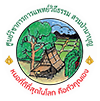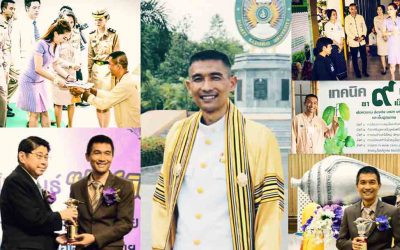ภูมิปัญญาการเคี้ยวกวฬิงการาหารเพื่อสุขภาวะ ในประเทศไทยและสาธารณรัฐประชาธิปไตยประชาชนลาว
ภูเพียรธรรม กล้าจน
วิทยานิพนธ์นี้เป็นส่วนหนึ่งของการศึกษาตามหลักสูตรปรัชญาดุษฎีบัณฑิต
สาขาวิชายุทธศาสตร์การพัฒนาภูมิภาค (สาธารณสุขชุมชน)
คณะกรรมการบัณฑิตศึกษา มหาวิทยาลัยราชภัฏสุรินทร์ พ.ศ. 2561
ลิขสิทธิ์ของมหาวิทยาลัยราชภัฏสุรินทร์
- ชื่อเรื่อง : ภูมิปัญญาการเคี้ยวกวฬิงการาหารเพื่อสุขภาวะในประเทศไทยและสาธารณรัฐประชาธิปไตยประชาชนลาว
- ผู้วิจัย : ภูเพียรธรรม กล้าจน
- ปริญญา : ปรัชญาดุษฎีบัณฑิต
- สาขาวิชา : ยุทธศาสตร์การพัฒนาภูมิภาค
- อาจารย์ที่ปรึกษาวิทยานิพนธ์ : อาจารย์ ดร.อุษา กลมพันธ์, รองศาสตราจารย์ ดร.อัจฉรา ภาณุรัตน์ และ อาจารย์ ดร. สิงหา จันทริย์วง
บทคัดย่อ
การวิจัยเรื่อง “ภูมิปัญญาการเคี้ยวกวฬิงการาหารเพื่อสุขภาวะในประเทศไทยและสาธารณรัฐประชาธิปไตยประชาชนลาว เป็นการศึกษาโดยใช้กระบวนการวิจัยแบบผสานวิธี (Mixed Methods Research) ระหว่างการวิจัยเชิงชาติพันธุ์วรรณนา (Ethnography Research) และการวิจัยเชิงปริมาณ (Quantitative Research)
มีวัตถุประสงค์การวิจัย คือ
1) เพื่อศึกษาภูมิปัญญาและพฤติกรรมการเคี้ยวกวฬิงการาหารเพื่อสุขภาวะในประเทศไทยและสาธารณรัฐประชาธิปไตยประชาชนลาว
2) เพื่อทดลองภูมิปัญญาการเคี้ยวกวฬิงการาหาร ที่บูรณาการตามหลักการแพทย์วิถีธรรม ในสวนป่านาบุญ 1 อำเภอดอนตาล จังหวัดมุกดาหาร จำนวน 5 คน
3) เพื่อวิเคราะห์องค์ประกอบภูมิปัญญาการเคี้ยวกวฬิงการาหารเพื่อสุขภาวะในประเทศไทย และเสนอยุทธศาสตร์การส่งเสริมสุขภาวะในชุมชน
การวิจัยเชิงชาติพันธุ์วรรณนา ศึกษาและเก็บข้อมูลหลักจากกลุ่มผู้ให้ข้อมูลหลัก ประกอบด้วย กลุ่มสมณะหรือนักบวช พระภิกษุสงฆ์ นักปฏิบัติธรรม ผู้ที่มีสุขภาพดี บุคลากรทางด้านสาธารณสุข และผู้ประกอบอาชีพสาขาต่าง ๆ จิตอาสาแพทย์วิถีธรรมและจิตอาสาทั่วไป รวมถึงประชาชนทั่วไป ที่ให้ความสำคัญกับพฤติกรรมการเคี้ยวกวฬิงการาหารเพื่อสุขภาวะในการปฏิบัติตนในการดำเนินชีวิตประจำวัน ได้อย่างเป็นปกติหรือในขั้นของรูปแบบการฝึกฝนปฏิบัติธรรมอันเป็น “อธิศีล อธิจิต อธิปัญญา”
เพื่อการปรับเปลี่ยนพฤติกรรมสุขภาพกายวาจาใจ ได้อย่างยั่งยืนและเบิกบานไปเป็นลำดับ ๆ ในประเทศไทย และประเทศสาธารณรัฐประชาธิปไตยประชาชนลาว รวมจำนวน 99 คน การวิจัยเชิงปริมาณ นำผลข้อมูลจากการวิจัยเชิงชาติพันธุ์วรรณนา สรุปประเด็นสร้างข้อกระทงคำถาม (Questionnaire) และวิเคราะห์ทางสถิติการวิเคราะห์องค์ประกอบ (Exploratory Factor Analysis) โดยสำรวจกับกลุ่มผู้ให้ข้อมูลหลักในประเทศไทยจำนวน 593 คน
ผลการวิจัย
1. การศึกษาภูมิปัญญาและพฤติกรรมการเคี้ยวกวฬิงการาหารเพื่อสุขภาวะที่ทำเป็นประจำในชีวิตประจำวันของสังคมชาวไทยพุทธและลาวพุทธที่ได้เรียนรู้และปรับสัมมาทิฏฐิอันถูกต้องถูกตรงตามผู้รู้แท้ที่พาพ้นทุกข์ได้จริง
(สัตบุรุษ) พบว่า ในเชิงลึก ให้ความสำคัญกับภูมิปัญญาในการมีสติสัมปชัญญะที่จะพิจารณาแยกแยะกำหนดการกระทำทางกาย วาจา ใจ ในการเคี้ยวอาหาร รู้คุณค่าที่แท้จริงของชีวิต ว่าเคี้ยวอาหารเพื่อได้ประโยชน์สาระที่แท้จริงของชีวิต ได้ความเข้มแข็งทางด้านจิตใจ ความแข็งแรงทางด้านร่างกาย มีปัญญาเห็นว่าไม่ได้เคี้ยวกินเพื่อความอร่อย เพื่อเสพในกามคุณ 5 รูป รส กลิ่น เสียง สัมผัส ซึ่งส่งผลดีต่อสุขภาวะทางร่างกาย จิตใจ เศรษฐกิจ สังคม สิ่งแวดล้อม และปัญญา ตามอินทรีย์ของแต่ละท่านในเชิงรูปธรรม ทำให้ระบบย่อยมีประสิทธิภาพสูงสุด ฝึกสติสัมปชัญญะ ลดความใจร้อน ช่วยรักษาโรค ประหยัดค่าใช้จ่าย และมีสติที่จะพิจารณาแยกแยะกำหนดการกระทำในการดำเนินชีวิตประจำวันได้อย่างเป็น “ศีล สมาธิ ปัญญา” ตามความเข้าใจอันถูกต้องถูกตรง (สัมมาทิฏฐิ)
2. การทดลองปฏิบัติของภูมิปัญญาการเคี้ยวกวฬิงการาหารเพื่อสุขภาวะบูรณาการตามหลักการแพทย์วิถีธรรม พบว่า ในระดับเบื้องต้นทางวัตถุ คือ อาหารกาย เป็นการเคี้ยวอาหารให้ละเอียด ทำให้ย่อยและดูดซึมง่ายเพราะในขณะที่เคี้ยวอาหารให้ละเอียดจะทำให้ได้พลังชีวิตทันที
ส่วนในระดับเบื้องลึกทางจิตวิญญาณ คือ อาหารจิตวิญญาณ เป็นการทำความผาสุกให้กับจิตวิญญาณ ฝึกปฏิบัติลดละล้างความชอบชัง ความติดมั่นยึดมั่นถือมั่นในรูป รส กลิ่น เสียง สัมผัส ในอาหารไปเป็นลำดับ ๆ
รวมถึงการพิจารณาในระหว่างการเคี้ยวอาหารเพื่อให้ได้ประโยชน์ที่แท้จริงของชีวิต ในการประมาณการบริโภค (โภชเนมัตตัญญุตา) และล้างความชอบชังในอาหาร (อาหาเรปฏิกูลสัญญา) ที่ส่งผลให้มีสุขภาวะกาย ใจ เศรษฐกิจ สังคม สิ่งแวดล้อม และปัญญา ที่เป็นความผาสุกและ
เบิกบาน อย่างยั่งยืน ไปเป็นลำดับ ๆ ตามเหตุปัจจัยที่จัดสรรได้อย่างเหมาะสมและตามอินทรีย์ของแต่ละท่าน
3. ผลการวิเคราะห์องค์ประกอบภูมิปัญญาการเคี้ยวกวฬิงการาหารเพื่อสุขภาวะในประเทศไทย ได้นำมาเสนอเป็นยุทธศาสตร์และข้อเสนอเชิงนโยบายขยายผลภูมิปัญญาการเคี้ยวกวฬิงการาหารเพื่อการส่งเสริมสุขภาวะของชุมชนในประเทศไทย 6 นโยบาย ตาม 6 องค์ประกอบ ต่อไปนี้
1) สุขภาวะจากการเคี้ยวกวฬิงการาหารอย่างประณีต มีผลปรากฏตามข้อธรรมโภชเนมัตตัญญุตา จิตลหุตาเจตสิก สัมมาทิฏฐิ อาหาเรปฏิกูลสัญญา และอินทรีย์ 5 อันเป็นขบวนระบบของปัญญา
2) อาหารมังสวิรัติ เป็นทั้งโภชนบำบัดและยารักษาโรคแล้วยังส่งเสริม “บุญ” และสิกขาตามลำดับ “ศีล สมาธิ ปัญญา”
3) อาหารคำข้าว คือ อุปกรณ์เคลื่อนไหวที่ใช้ฝึกจิตและพัฒนาสัมปชัญญะตามข้อธรรม “อาหาร 4”
4) บุคคลปฏิบัติการเคี้ยวการคายและการกลืนอาหารคำข้าวอย่างมีนัยสำคัญ อาจมีผลปรากฏเป็นสังขารุเบกขาญาณ ซึ่งนอกจากส่งเสริมระบบย่อยที่ดีแล้ว ยังลบระงับกิเลสและล้างความชอบชังได้อย่างลงตัว
5) การประดิษฐ์กวฬิงการาหารประณีต หมายถึง การบดปั้นแต่งด้วยมือส่งต่อการเคี้ยวช้าละเอียด ตะล่อมย่อยในปาก อาจมีผลปรากฏตามข้อธรรมสติปัฏฐาน 4 อันสามารถลดโมหะและส่งเสริมอาพาธน้อย และ
6) กลุ่มชาติพันธุ์ไทยและลาวมีลำดับการจัดสรรข้าวหุงหรือนึ่ง เทคโนโลยีการประกอบอาหารหรือทำกับข้าว การปั้นแต่งคำข้าว การบดเคี้ยวอย่างประณีต ตลอดถึงการกลืนและกลั้วคอ ให้สอดรับเพื่อกระเพาะย่อยสลายกลายเป็นยา คือ มรดกวัฒนธรรมกวฬิงการาหารเพื่อคุณภาพชีวิต
ยุทธศาสตร์ “ภูมิปัญญาการเคี้ยวกวฬิงการาหารเพื่อสุขภาวะ” เป็นยุทธศาสตร์การสร้างสุขภาวะปัญญาความผาสุกและเบิกบานในตน อย่างยั่งยืน ไปเป็นลำดับ ๆ
ซึ่งเป็นกระบวนการของ “ศีล สมาธิ ปัญญา” ที่เป็นกระบวนสร้างปัญญาแท้ในการปรับเปลี่ยนพฤติกรรมสุขภาพ ที่ต้นเหตุประหยัด เรียบง่าย ทำเอาเองได้ โดยการปฏิบัติตามผู้รู้แท้ที่พาพ้นทุกข์ได้จริง ไม่เสียค่าใช้จ่ายใด ๆ และเมื่อนำความรู้นี้ไปแบ่งปันกับผู้อื่นต่อโดยไม่เอาอะไรตอบแทน ช่วยสังคมให้ประหยัดงบประมาณในด้านสุขภาพ
เมื่อสุขภาพประชาชนแข็งแรง ชุมชนจะเข้มแข็ง สามารถพัฒนาประเทศชาติให้เจริญก้าวหน้าในการพึ่งตนเองได้ และขยายผลช่วยเหลือเพื่อนบ้าน รวมถึงประเทศอื่น ๆ ได้ต่อไป
WISDOM OF MASTICATION FOR HEALTH IN THAILAND AND LAOS PEOPLE’S DEMOCRATIC REPUBLIC
PHUPIENDHAM KLAJON.
DOCTOR OF PHILOSOPHY PROGRAM IN REGIONAL DEVELOPMENT STRATEGIES (PUBLIC HEALTH), SURINDRA RAJABHAT UNIVERSITY. ACEDEMIC YEAR 2018.
ABSTRACT
The research on “Wisdom of Mastication for Health in Thailand and Laos People’s Democratic Republic” was a mixed method research between ethnography research and quantity research.
The research objectives were
1) to study the way and behavior of food mastication for the well-being of the people in Thailand and Laos,
2) to conduct a trail on food mastication according to the way suggested by the Dhamma Medicine. There were five people participating in this research which had been contacted at Suanpanaboon 1, Don Tan District, Mukdahan Province, 3) to analyze the components of food mastication and to offer health promoting strategy in communities.
The data study of the ethnography research was mainly studied and collected from the 99 key informants of Thais and Laos who were Buddhist monks, those who practiced Dhamma, healthy individuals, public health officers, other occupational individuals, Dhamma Medicine volunteers, other volunteers and the general public who gave importance to the way they masticated their foods for their behavior well-being in their daily lives or the form of “higher Dhamma practice of higher precepts (athisila), higher spirit (athichit), and higher wisdom (athipanya),” in order to change their right conducts, right speech, and right concentration, or intellectual well-being, with higher spirits and sustainable, sequentially.
The quantitative research was studied and collected by questionnaire, constructed from the qualitative content analysis from the ethnography research, for statistical analysis on Exploratory Factor Analysis of 593 principal component informants.
The research findings were as follows :
1. It was found that Thais and Laos people, who had right understanding and mindfully practice their food mastication in their daily lives by following the truth knowledge men, they could determine their right physical actions, right speech, and right concentration.
They valued food mastication, in deep-understanding, for the most benefits rather than the five sensual desires and gained physical and mental strength. People intellectually realized that they do not chew or eat for forms, tastes, odors, sounds, touchs and feels which formed, substantial, the individual’s physical mental, economic, social, environmental, and intellectual capacity to maximize efficiency of their digestive system.
In addition, they had been practicing mindfulness to reduce impulsive behavior which cures disease with low cost, and differentiated daily actions by applying precepts (Sila), supra-concentration (Samathi), and the wisdom (Panya) according to the virtue understanding.
2. The experimental practice of food masticating for well-being, according to the Dhamma Medicine principles, led to primarily understanding of finely masticating food will be better and easier to absorb. Simultaneously, proper mastication would result in vitality and give immediate energy.
Furthermore, on a spiritual level, it gave a spiritual happiness. The exercise of mindfully food mastication helped to reduce desires and ego, sense of self (Atta) which were forms, tastes, odors, sounds, touchs and feels in foods including contemplating during masticating for the most benefits of moderating in eating and reducing desires and ego resulting to individual’s physical, mental, economic, social, environmental, and intellectual capacity, which were healthy behavior shifts with happiness, high spirits, clarity and sustainable, sequentially.
3. The components of food mastication suggested formulating the strategies and policies to magnify an outcome and promoting healthy living in communities in Thailand. The 6 policies are:
1) The bliss of enjoyment from the mastication of food results in the following virtues, moderation in eating, mental factor righteousness, right understanding, mental formulation of defilements in food and the five-sense forces. Those are the process to develop the wisdom,
2) The plant-based (pure vegetarian) foods both are Nutritionals and Medicine. In addition, it helps promote “virtue” (reducing defilements) and gradually Vipassana (athisila, athichit, athipunya),
3) Eating a perfect bite size of food is a movement tool to train the mind and body to be able to gradually synchronized. It is the way to practice the mind and develop wisdom or mindfulness as of four-nutriment virtues: physical nutriment, contact nutriment, mental nutriment, and consciousness as nutriment.
4) A person who practices Vipassana by mindfully eating technique may result in awareness which promote healthy digestive system and can also get rid of lust and hatred,
5) There are two steps in eating food. First, placing the food in the mouth by hand, and then is masticating to allow the saliva to start digestive process. While doing these two steps, there are four foundation of mindfulness principles that have been applied, contemplation of the body, feelings, mind, and mind objects (regards ideas). These principles help reducing the state of delusion and become healthier,
6) Thai and Laos’s tradition of cooking and steaming of rice have many benefits. Taking small bite of food, fined chewing, swilling the food in your mouth, and swallowing are the best digestive system for making your food a medicine for your body.
The strategy on “The Wisdom of Mastication for Health” is the truth strategy for creating the senses of happiness, well-being, and high spirits in one’s own order, which is the process of “precepts (Sila), supra-concentration (Samathi), and the wisdom (Panya).”
This is the wisdom process for practicing mindfulness reducing impulsive behaviors with save cost, simple, and capable of practicing by oneself by following the truth knowledge men that lead to well-being. It is free, and when sharing this knowledge with others since you are able to practice the wisdom, this helps the society save money on health. When people are healthier and leads to the strong health of the communities, this will be able to develop the country to flourish in self-reliance. Then this can help the neighbors, and other countries, continuously.
วิธีใช้ Embed PDF
- กรุณากดลูกศร ซ้าย-ขวา ในการเปลี่ยนหน้า
- ถ้าหากตัวอักษรเล็ก-ใหญ่เกินไป กรุณากดเครื่องหมาย บวก-ลบ เพื่อปรับขยาย-ลดตัวอักษร
ประวัติผู้วิจัย
| ชื่อ –สกุล | นางสาวภูเพียรธรรม กล้าจน |
| วัน เดือน ปี เกิด | 26 ธันวาคม พ.ศ. 2511 |
| ที่อยู่ปัจจุบัน | ศูนย์เรียนรู้สุขภาพพึ่งตนตามแนวเศรษฐกิจพอเพียง สวนป่านาบุญ 114 หมู่ 11 ตำบลดอนตาล อำเภอดอนตาล จังหวัดมุกดาหาร 49120 |
| ประวัติการศึกษา | • พ.ศ. 2562 ปรัชญาดุษฎีบัณฑิต สาขายุทธศาสตร์การพัฒนาภูมิภาค (สาธารณสุขชุมชน) มหาวิทยาลัยราชภัฏสุรินทร์• พ.ศ. 2545 ประกาศนียบัตรบัณฑิตทางภาษาอังกฤษเพื่ออาชีพ (Graduate Diploma in English for Careers) สถาบันภาษา มหาวิทยาลัยธรรมศาสตร์ • พ.ศ. 2540 บริหารธุรกิจมหาบัณฑิต สาขาการบัญชีบริหาร คณะพาณิชยศาสตร์และการบัญชี มหาวิทยาลัยธรรมศาสตร์ • พ.ศ. 2538 บริหารธุรกิจมหาบัณฑิต สาขาการบริหารการเงิน สถาบันบัณฑิตพัฒนบริหารศาสตร์ (นิด้า) • พ.ศ. 2535 ประกาศนียบัตรบัณฑิตทางการสอบบัญชี คณะพาณิชยศาสตร์และการบัญชี มหาวิทยาลัยธรรมศาสตร์ • พ.ศ. 2533 บัญชีบัณฑิต (เกียรติ์นิยมอันดับสอง) มหาวิทยาลัยธรรมศาสตร์ |
| ประวัติการทำงาน | • พ.ศ. 2553 – ปัจจุบัน จิตอาสามูลนิธิแพทย์วิถีธรรมแห่งประเทศไทย • 2550 – 2552 ที่ปรึกษาอิสระด้านการรายงานทางการเงิน • 2549 – 2533 วิชาชีพ ผู้สอบบัญชีอิสระ |


